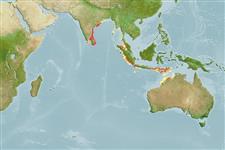Teleostei (teleosts) >
Perciformes/Uranoscopoidei (Sand dwellers) >
Ammodytidae (Sand lances)
Etymology: Bleekeria: He researched the fishes from India and Malaysia, 1862-1878 (Ref. 45335).
Eponymy: Dr Pieter Bleeker (1819–1878) was an ichthyologist and army surgeon commissioned (1841) by the Dutch East India Company. [...] (Ref. 128868), visit book page.
More on author: Günther.
Environment: milieu / climate zone / depth range / distribution range
Ecology
Marine; benthopelagic; depth range 40 - 80 m (Ref. 124631), usually ? - 40 m (Ref. 124631). Tropical
Eastern Indian Ocean: India.
Size / Weight / Age
Maturity: Lm ? range ? - ? cm
Max length : 15.0 cm TL male/unsexed; (Ref. 124631)
Dorsal soft rays (total): 40; Anal soft rays: 15 - 16. This species is distinguished by the following characters: D 40; A 15-16; pectoral fin rays 13-14; no pelvic fins; lateral line 98-105, gill rakers 6 + 1 + 19-20 = 26-27; branchiostegal rays 7; body depth at dorsal origin 11.1%-11.8%SL; head length 4.6-4.8 in SL; eyes large, eye diameter 3.35%-4.4%SL; 3-4 broken, discontinuous yellow stripes on body (Ref. 124631).
Cross section: oval.
This species is reported to be regularly caught by trawlers operating within 80 m depth (mostly within 40 m) along the east coast of India and is locally marketed for domestic consumption (Ref. 124631).
Life cycle and mating behavior
Maturity | Reproduction | Spawning | Eggs | Fecundity | Larvae
Akhilesh, K.V., K.S.S.M. Yousuf, S.J. Kizhakudan and P.U. Zacharia, 2019. Redescription of Bleekeria kallolepis (Actinopterygii: Perciformes: Ammodytidae) from Chennai, eastern Indian Ocean. Acta Ichthyol. Piscat. 49(1):95-99. (Ref. 124631)
IUCN Red List Status (Ref. 130435: Version 2025-1)
Threat to humans
Harmless
Human uses
Fisheries: subsistence fisheries
Tools
Special reports
Download XML
Internet sources
Estimates based on models
Preferred temperature (Ref.
123201): 23.9 - 27.4, mean 26.9 °C (based on 22 cells).
Phylogenetic diversity index (Ref.
82804): PD
50 = 0.5039 [Uniqueness, from 0.5 = low to 2.0 = high].
Bayesian length-weight: a=0.00324 (0.00167 - 0.00628), b=3.06 (2.89 - 3.23), in cm total length, based on LWR estimates for this species & (Sub)family-body (Ref.
93245).
Trophic level (Ref.
69278): 3.2 ±0.4 se; based on size and trophs of closest relatives
Resilience (Ref.
120179): High, minimum population doubling time less than 15 months (Preliminary K or Fecundity.).
Fishing Vulnerability (Ref.
59153): Low vulnerability (10 of 100).
🛈
